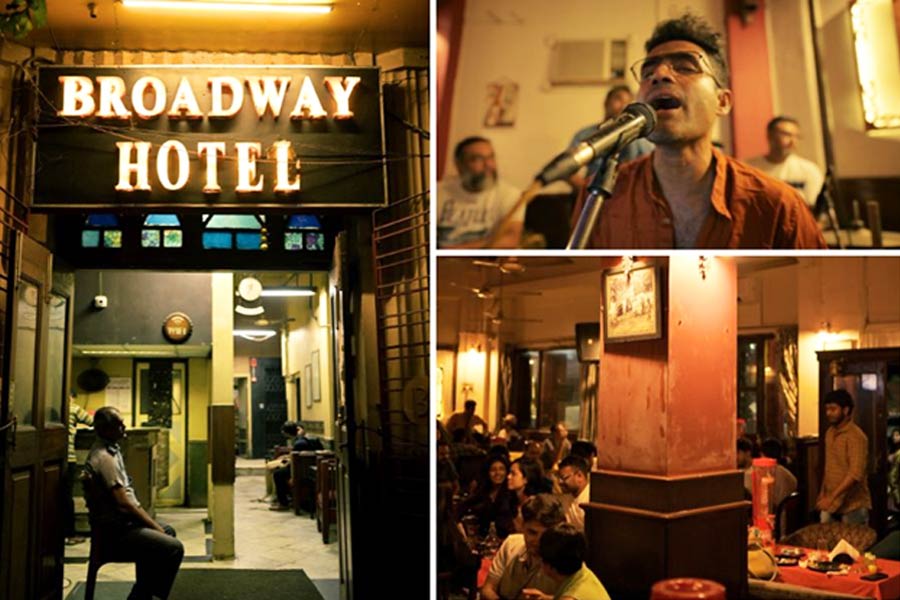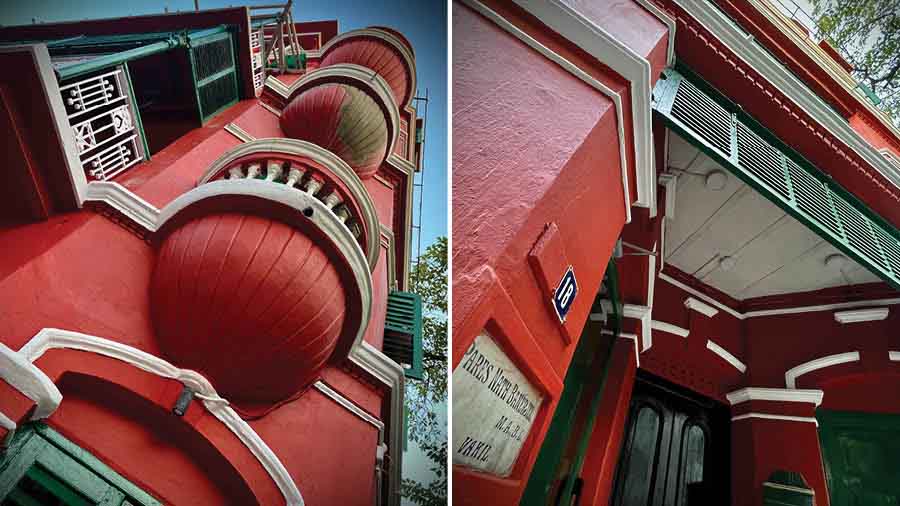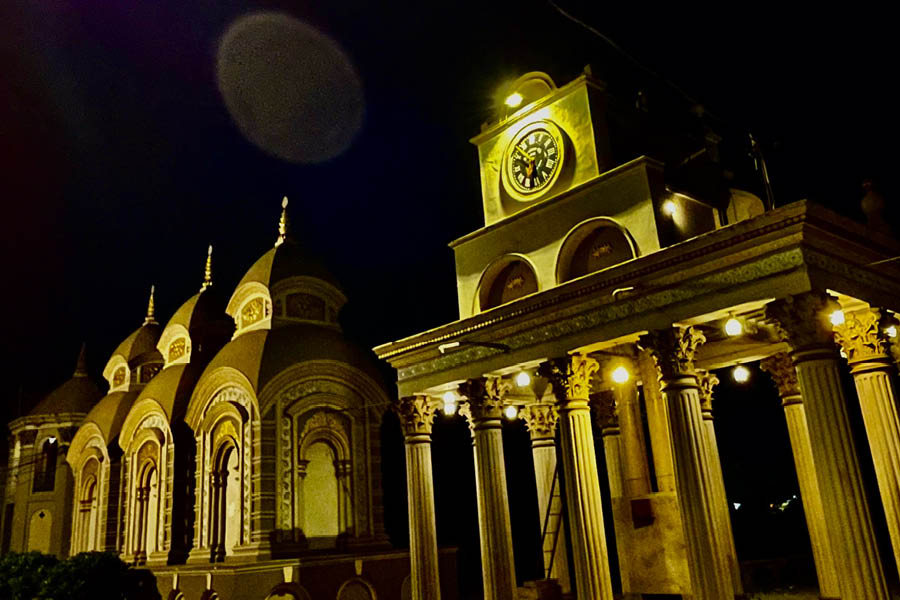I lived on Ganesh Chandra Avenue for the first 35 years of my life. Only once did I enter Broadway Hotel, the fifth building from ours.
Broadway Hotel was a fatigued property with eroded sunmica edges. You could cut nicotine out of the air. The man at the reception table doubled as the bouncer. The evening bulb would always be a cataract yellow. The floor would be red. The attached bath cost extra. You never saw anyone get out of a car to enter. You never encountered anyone in your social class casually say, “I was at Broadway the other day…”
That Broadway is dekhte-dekhte 87 — sitting in downtown Calcutta, nine minutes from Dalhousie, eight minutes from Esplanade, 30 seconds from the Metro station. Those who stayed at Broadway did so because it was nazdeek, because it was cheap (not that kind), because the rooms were as large as apartments, because the ceiling was 16 feet, because the furniture was Burma teak, and because if you drank yourself silly in the restaurant, the steward did not need to call a cab but simply hollered, ‘Abdul, saab ko kamra number saat me pahuncha do!’
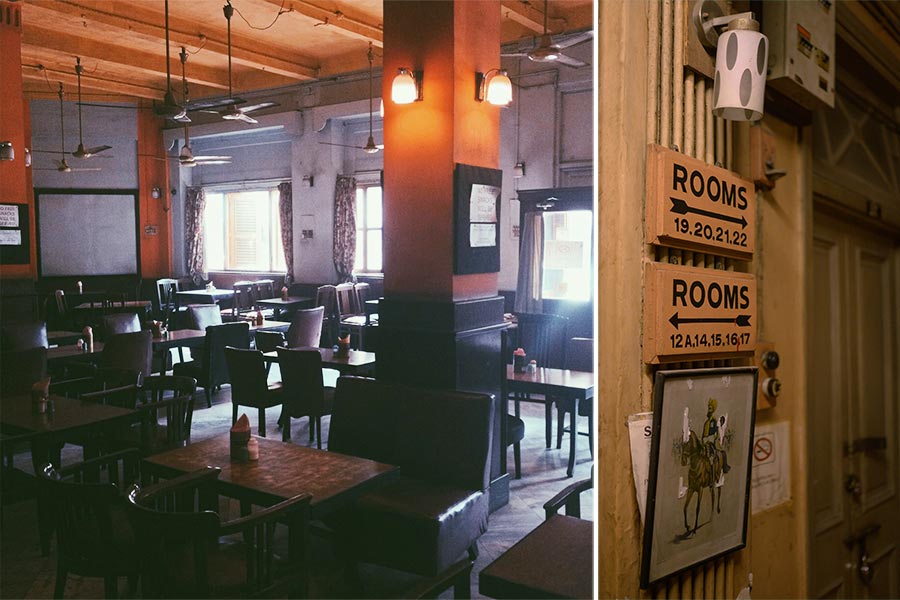
For most regulars, Broadway was kind of home — not perfect but it made visitors feel wanted
Broadway was kind of home. It was not perfect but it made visitors feel wanted. If everything was manicured, it would have made the place look tish-tash, the visitors may have felt that ‘Woh baat ab rahi nahi’ and they may have moved elsewhere.
So Broadway never changed. It only changed hands.
Changing hands
The hotel that Iqbal Singh had built around affordable living in 1937 was passed down to son Gyan Singh and when Gyan Singh passed away in 2012, the owners looked for a new buyer. Sandeep Sehgal heard from an acquaintance that Broadway was on the blocks, and I would rather that he tell the story from this point onwards.
“My father Prem ran a bar and garage across from Broadway for decades; in the early years, if he needed to use the restroom, he walked across to the hotel; if he needed to spend a relaxed evening, his friend Iqbal and he would have a sofa carried out onto the pavement (in those days the pollution outside was less than the cigarette smoke inside). When he heard that Broadway was up for sale and that I was contemplating buying it, he said ‘Dimaag kharaab toh nahi? Apne aukaat ke baahar hai.’
“The then owners said, ‘If you or your father enter, the staff will get wind of the fact that we are intending to sell.’ My wife Alka was asked to do a recce; in 15 minutes, she was given a tour of ‘This large room here, that large room there, this kitchen here and that spare room there.’ The family put its lifetime savings to buy — at 5x of revenues, which was not cheap — on the basis of nostalgia, fleeting memories and a 15-minute walking tour.
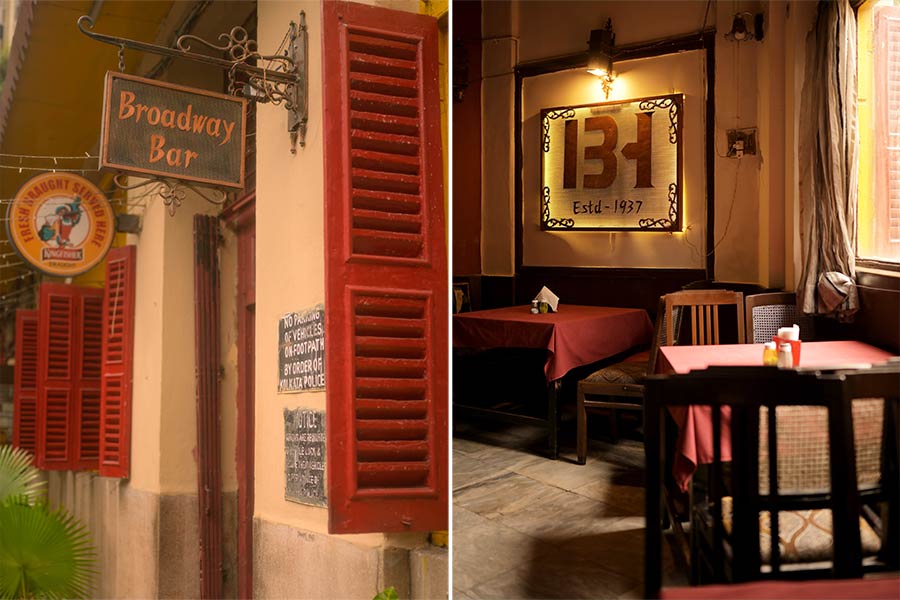
The interiors of the hotel, established in 1937, still remain the same with an upgrade in creature comforts like air conditioning
Acquiring a legacy
“What we got in exchange was 36 rooms priced below market, a bar reduced to a watering hole, rooms that were delivered baalti water for a bath. There was one thing that also came with this outdated property to someone with no hoteliering experience — fourth generation of walk-in guests who did not need a travel portal to tell them where to stay.
“The bearers came to share their stories of the romance of this multi-decade time freeze. Singer Suraiya Begum, who usually came with an entourage, stayed in a suite for months (presume they called her section ‘Madam ka ghar’ and never ‘Madam ka kamra’). All the pre-IPL Ranji Trophy teams who played in the city and paid Rs 100 per day per player found it convenient to stay in Broadway (someone said Dhoni stayed here before he played for India). There is a corner table at the bar which used to be reserved for Lala Amarnath. There was a guest who came to Calcutta after 70 years from the USA and one of the first places he wanted to see was Broadway. Stories and stories. We realised the enormity of what we had acquired after we moved in.”
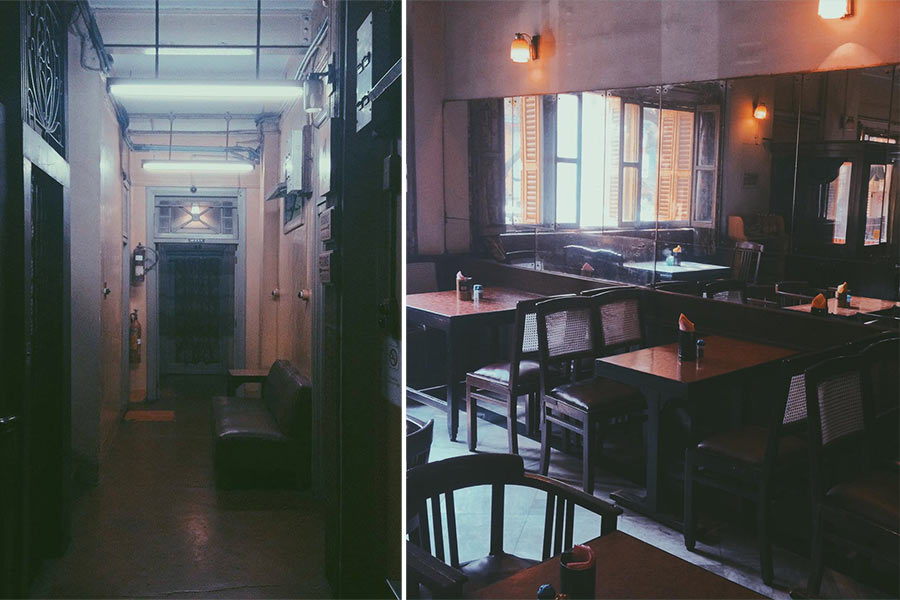
In its golden days, Broadway's clientele included singer Suraiya Begum and Ranji Trophy team members
Let us pause Sandeep Sehgal at this point. One would have expected that the immediate agenda at Broadway would have been to shut the place for three months, retrofit the rooms, paint the walls, overhaul the restaurant, change the curtains, discard the oversized metal room typefaces (‘301’and ‘302’) and place a smiling lady at the reception. The Sehgals tarried; they conducted business as usual (except for ACs in rooms and geysers in bathrooms).
The Sehgals took five years for their first big move. The son Raghav returned from the USA and, by way of family allocation of responsibilities, was ‘given the restaurant’. It is Raghav’s turn at the narrative.
Old nostalgia, new tunes
“I spent the first year researching the city’s ethos, and the character of the place we had acquired. During this period, I was coincidentally at a party of youngsters who had left the city and had temporarily returned. I casually asked: ‘What in the city do you miss most?’ One said, ‘Broadway.’ I felt I had heard wrong. I went back and wrote a vision statement for the hotel and the ground floor restaurant: ‘Anyone who thinks about Calcutta hospitality must think about Broadway.’
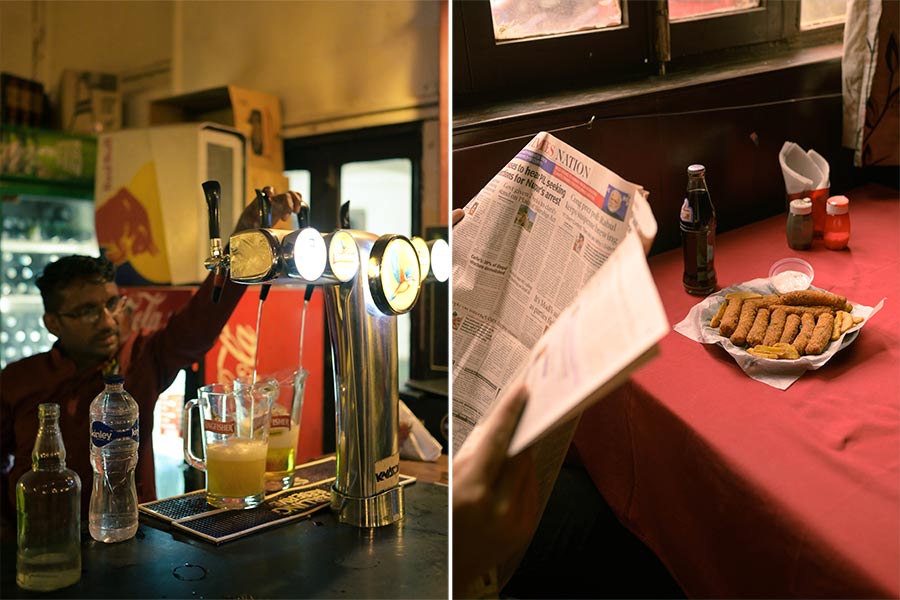
People find in Broadway a time capsule in a neon world... This is still one place where they can be who they are, believes Raghav Sehgal
“I have been asked: ‘What about Broadway do people find most engaging or endearing?’ This is what I realised: People find in Broadway a time capsule in a neon world. In 2024, this is one pocket of Calcutta where it is still 1980. This is one part of the city that is still ‘of their time’. This is still one place where they can be who they are.
“We felt that the missing part of the restaurant was the music. If we introduced live music, we would extend the personality of the place deeper into the past. We introduced jazz, blues and classical rock in December 2020 — just as in the 1970s. The timing was right: the world was recovering from the pandemic and needed to feel good about being alive; celebrated drummer Nondon Bagchi had no place to perform; we were keen to introduce a new sound in Calcutta; we revived the Beatles era and sent out a message ‘Nondon is back!’
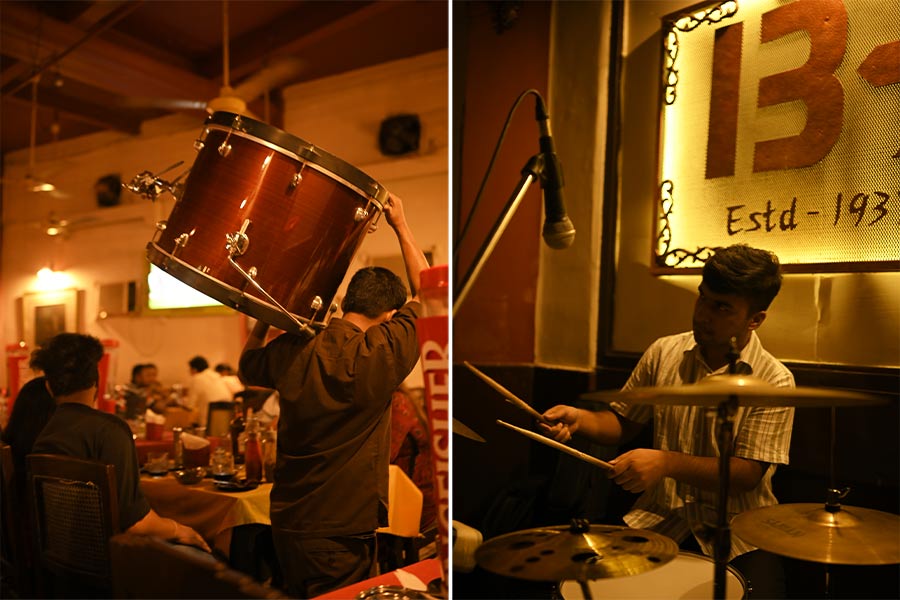
The new owners felt that what Broadway was missing was the live music
“We did this only one day of the week — our weakest attendance day. There is no office crowd we get on Sunday; we needed a good act to fill our place. We started with a lukewarm crowd, no great shakes, and we realised that this would be our test. We needed to remain consistent, consider the additional cost (or deficit) as an investment and hope that one day the tide would turn.
“And turn it did. The visitors increased gradually; we would count the seats taken and said ‘We moved by three seats today’. By 2021 end, we had every single one of the 150 seats taken and 10 people standing outside. That kind of woke us up. I had manned the gate each Sunday for a year; on one of those Sundays we had people waiting outside for 90 minutes. I had to keep walking out to engage them in good humour until it soon struck me that we now needed to have a waiting room inside for them to sit in.
“A virtuous cycle emerged: some of the musicians who had initially said lazily, ‘Not Broadway, come on!’ now began to ask, ‘Got a slot free for us?’ Their raw informal music caught on; they would experiment; guests would stand impulsively and dance; a 60-year-old lady and a 25-year-old danced (they never knew each other); the word began to go around that ‘Bro, you get draught beer for Rs 100 a glass, there is no entry fee, the sound effect fills every square inch of the blooming restaurant and by jove, when they play the Beatles, they really play the Beatles!’
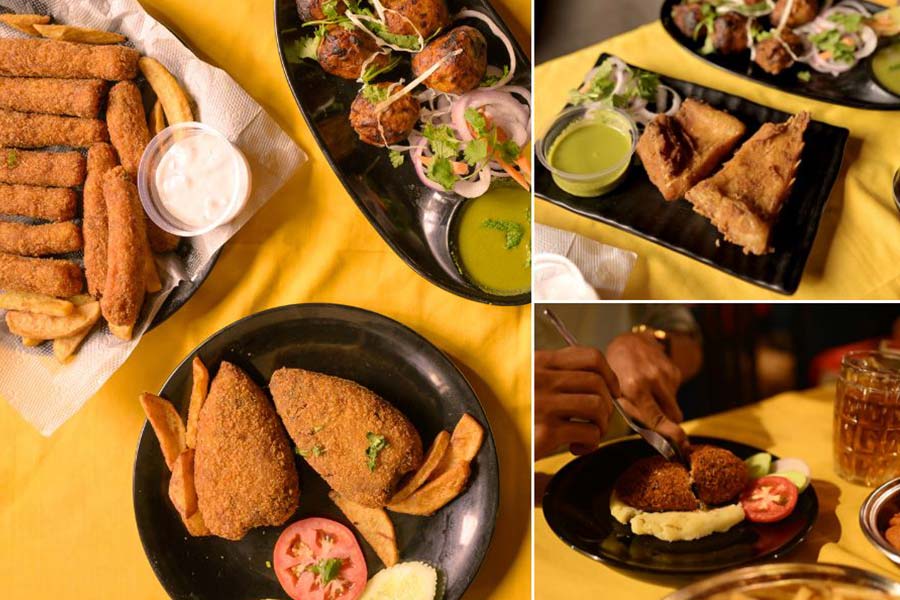
The menu has seen new additions but still features classic favourites, from fish fingers and cutlets to 'maachh bhaja'
“By close 2022, we had created — I swear — a music community. A number of them were regulars. Different bands. No performance template. No standing room. There was one afternoon during the 2023 Pujas when I got a call from my dad, who said, ‘Come fast. Take over!’ I reached to find 200 people on the pavement. Two hundred. They were willing to wait. That day I turned from owner to ‘owner-bouncer-manager’.
An old-new song
“What we have demonstrated is really the power of curated music. The place is just the way it was 30 years ago. All we have changed is the tablecloth, air-conditioning and some menu parts. The rest is the way it used to be. Anyone in our place would have jazzed the place up with new tiles, curtains, bar counter, name in handwritten neon behind the counter, and paint. We said, ‘People are coming for what used to be, not what it can be.’ We knew what not to change. Probably the smartest thing we did.
“What have been my learnings? Calcutta is not dead; Calcutta needs good curation. You don’t necessarily get great results with a high budget. Some five-star types got our musicians to perform there and it made no difference. You need to understand the pulse of this city. You need a menu customised to this city. You need music customised to this city. Respect what this city was. Recreate what this city was. Give people a reason to be proud. Then it will respect you.
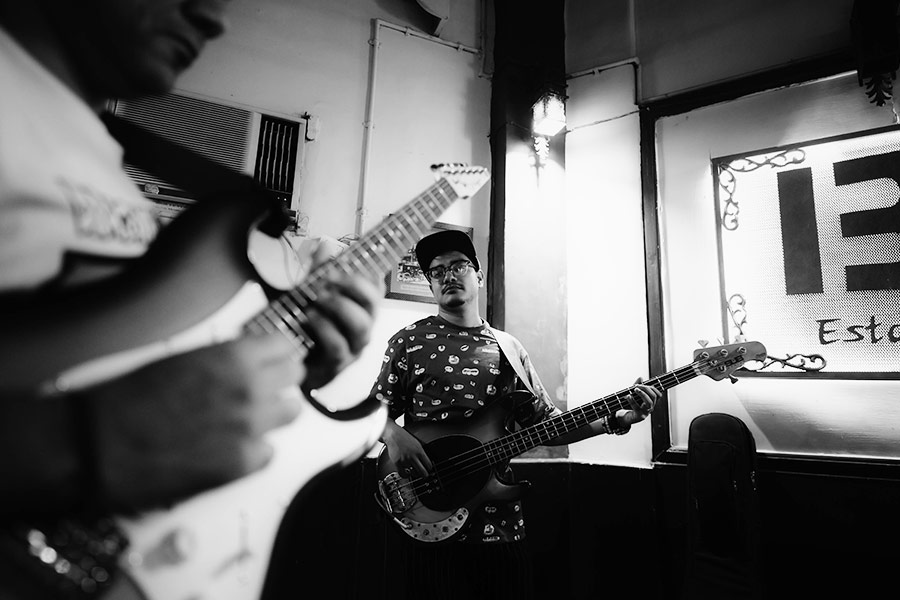
Live music performances enliven Broadway every Sunday
“We have emerged from nowhere to become the number one live music venue in the city based on the music alone; our Sunday would be the seventh in terms of day revenue across the week; it is now number one or number two; we are now being spoken about as a cult location.
“There used to be a time not too long ago when if a woman entered the place on a weekday, heads would turn. On any given Sunday, women account for half the chairs.
“When we first suggested ‘music’, someone in the family said, ‘No one is going to come to Chandni Chowk to listen to music!’ One of the bearers pitched in: ‘Itna aawaaz me customer ka order koi kaise sunega?’ The same bearer now takes videos of the music!”
This gives me an idea. If the large and vacant terraces of the grand buildings on Dalhousie could be turned into open-air restaurants, if fashion shows could be curated in these colonial stairways or corridors, if music an enliven the lonely streets of a weekend Dalhousie, then this may still be one of the most wondrous cities this side of the Suez.
Broadway Hotel is showing us how.
